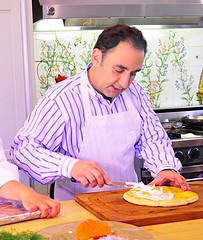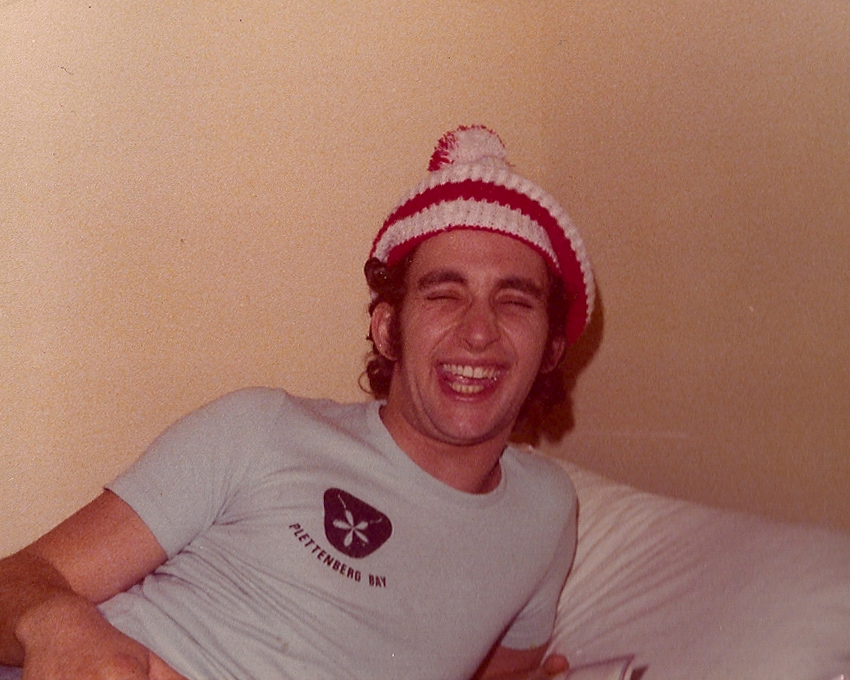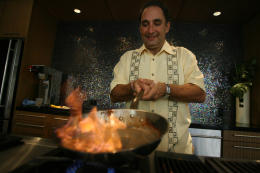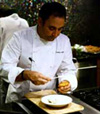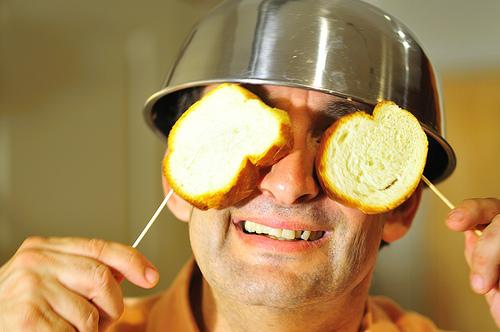Clive Berkman
Berkman, a native of Johannesburg, South Africa, grew up with a love and adoration of good food closely watching his mother teach cooking classes in the back of their home. Instinctively at age six, he selected a one-ounce jar of Beluga caviar from the refrigerator and devoured it. Continuing in his mother’s footsteps, Berkman decided to be a cook while he was in the army. He was sent to Middleburg, the coldest spot in Southern Africa, and immediately volunteered to be a kosher chef, spending the next six months in the kitchen. Happily appealing to those he served, Clive soon became the captain’s personal chef, moving to a new kitchen and cooking strictly for officers. Upon leaving the army, he attended chef training at Cassio College in London and traveled to the vineyards of Germany and France to learn the art of winemaking. After completing his education, Berkman relocated to New York and later moved to Miami, where he met his mentor, Victor Broceaux, director of research and development for Restaurant Associates. They worked together to open Reflections on the Bay in the Miami Marina. While in Miami, Berkman worked as service director for Banker’s Club of Miami and later as part of a regional team for Club Corporation of America, operating several clubs in the Miami area. In 1982, he moved to Houston and began his illustrious career at Charley’s 517. Berkman helped create Charley’s wine cellar and hosted themed vinter dinners with proceeds donated to various charities. He also helped carry the restaurant through the oil market crash of the mid-80’s with creative pricing strategies. As managing director of Charley’s 517, Berkman was responsible for hosting dinners for former President George Bush and Texas Governor George W. Bush, as well as actors and actresses, sports personalities, foreign dignitaries and local socialites through his catering company, Crème de la Crème. After the restaurant burned to the gound in 1998 he reopend the restaurant as Clives. Berkman has since become a noted wine expert and teaches wine education and appreciation courses. He also helped establish the University of Houston Hilton College. Berkman has been on a number of food and wine panels and is often called upon to host wine seminars and cooking classes In July of 2001 Clive joined the staff at Houston’s Second Baptist Church. He was given the responsibility of leading their Singles and Single parent ministries. This included hosting and planning 18 weekly bible study classes and monthly outreach events. Berkman is known for his humor, warmth, creativity, and love for people. He currently provides private cooking classes and group demonstrations, creating empty bottle moments whenever possible. Berkman lives in Houston.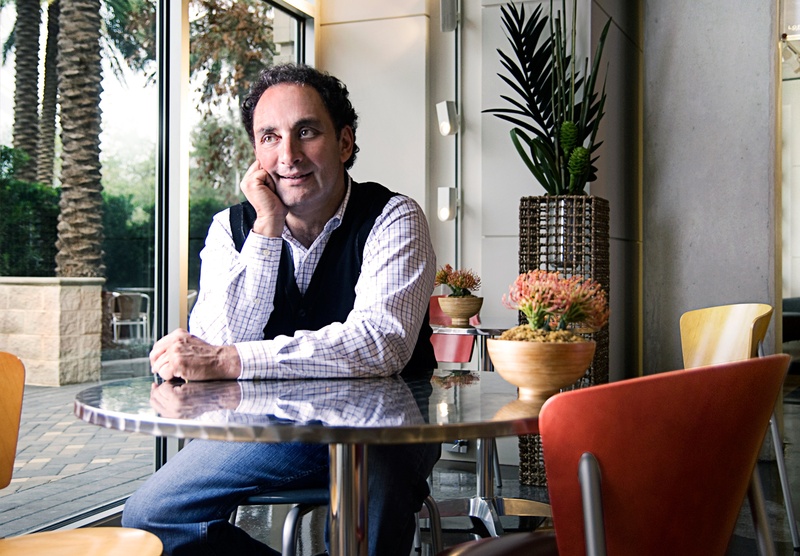 Clive Berkman, author of Creating Empty Bottle Moments: Cooking with Clive is known as the chef, manager, and owner of one of the finest restaurants in Houston. Under his guidance, the restaurant achieved many accolades, including The DiRoNa Award and Travel and Holiday magazine’s Dining Award. It is one of only three restaurants in Texas to win Wine Spectator magazine’s Grand Award.
Clive Berkman, author of Creating Empty Bottle Moments: Cooking with Clive is known as the chef, manager, and owner of one of the finest restaurants in Houston. Under his guidance, the restaurant achieved many accolades, including The DiRoNa Award and Travel and Holiday magazine’s Dining Award. It is one of only three restaurants in Texas to win Wine Spectator magazine’s Grand Award. 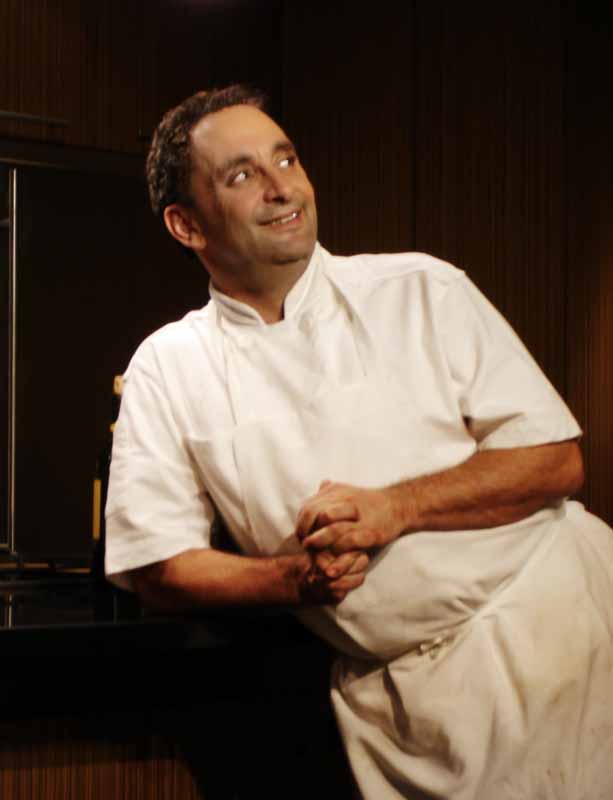 throughout the country.
throughout the country.
After having received so many requests to provide upscale concession items at various outdoor festivals and events, Berkman created a subsidiary, which he dubbed True Concessions. This entity provides concessions management to venues such as Miller Outdoor Theater as well as numerous events including Houston Industries Power of Houston, the Houston International Festival and the Houston International Jazz Festival.
Up close with Clive
What was it like growing up in South Africa with the political unrest, apartheid and all the upheaval that was happening? There was certainly unrest. I had to do army training and everybody was in the compulsory national service. You could feel it. I was actually involved in what turned into a riot in 1976 (Soweto). It started off as a march and turned into one of the big riots. Being raised Jewish, my family had actually fled Europe and that's how they ended up in South Africa. There was always a consistant undertone of unrest, a 'when will be have to leave again' kind of thing. It turned out that we did leave. Through most of it we were sheltered. I grew up in a middle to upper class family. We had all the privileges and luxuries of the world. We had one TV in my house growing up and I still have only one. Because you didn't have TV as the center of your world, you had to have people as the center of your world. That's the message of my book and exactly what I do every day. Let's talk about your family dynamic. You are the oldest of the children. There's an 8 1/2 year difference between me and my brother and sister. I always joke that when I came out my family just didn't know how to deal with me. I often ask people what do you get when you cross a chemical engineer with an actress? The result is me. Think about those two individually and it's like a vinaigrette. They don't go together, one has a very structured approach to things and has a German background as well. My mother, who came from a very creative background, was an actress. I was confused and maybe had a dash of ADD. It was a struggle for me because my father wanted this cookie cutter kid, who did well in school, got straight As, the engineer. School wasn't an easy thing for me. There was a dynamic in my family that I always felt I was a disappointment to them. I ended up being sent to boarding school. When I finished high school, I went to college, because that's what was expected of me. Old world mentality, especially being the oldest son in a Jewish family, your whole life was planned out for you. Exactly. After the first semester my father realized this wasn't going to be a happening thing for Clive to go to school. One day I came home and I was shipped to the army. You come home from school, your bags are packed and your dad takes you to enlist in the army? What was going through your mind? I'm sure he wasn't your favorite person at that moment. No he wasn't, but at that point in time I was used to it. I had been shipped off to boarding school twice. I was the bad child. The boy who gets sent to the corner, in detention, extra curricular teaching for him. While it hurt and it was painful, I can still remember the train ride to this day. I was on that train literally crying to go home. I ended up in the army, but I had to deal with it and make the best out of it. In a hurry, sure enough I became the Kosher Chef.
How does that happen? You enter the military and end up being the chef. I was in the infantry, doing basic training. There were about 17 Jewish guys in the camp and in those days there was a law that if they wanted Kosher food, just like on the airlines, they had to give it to you. We spoke to a chef here in Florida who told us you don't find a culinary career, it finds you. Do you agree? Great words and without a doubt. I did go to hotel and restaurant management school and we did take two semesters of cooking. I enjoyed it and ended up using it to make a supplementary income. A dishwasher/cook in a little Italian restaurant in the village where I lived in England. Looking back at your father's style of discipline, how do you think that's affected you as a man today? First of all I had to shake the little whispers that said, 'You're not quite good enough, you're not doing the right thing.' At the same time, the influence of his attention to detail and desire to do things right, he was very much a perfectionist, I realized it wasn't perfection that I was after, it was just doing it right. It influenced me from a standpoint of my attention to detail. You get out of school with the goal of hotel/restaurant management and yet ended up being a cook. How did that happen? I went to England, another disaster if you want or challenge, I should say. My family had left South Africa and went to New York. That was problematic for me because I was hoping to go back to South Africa after I finished school. When they left I was like, 'Where do I belong?' I ended up following them to NY, spent a little bit of time there. At that time, 1979, I couldn't stand New York at all. Before we discuss New York, let's talk about being that cook in England. That was a job opening and I wanted to make some extra money. Businesses would post different job opportunities in the school and it was in the building right next to where I was living. You did it more out of convenience and survival. Yes, exactly, and the same thing applied to the army. Not everyone has an opportunity to visit a vineyard, you got to work on one. You worked at a champagne vineyard. You knew nothing about the industry at the time. I can only imagine that you must have some very funny stories about that time. Share one with us. My first week harvesting, we had come back from the fields, we're in Champagne and they cooked for all the guys who harvested. Afterwards they take you out to this little hole in the wall bar and you drink and play Foosball. One of the drinks they serve you is Eau de Vie de Champagne. They take all the skins and residuals left over from the pressings and they ferment it. After fermentation they distill it until it becomes highly potent, similar to a brandy and then they sweeten it, almost like a mint julep. We drank many glasses and they took a picture of me drunk, and I still have that picture.
That wasn't the bad part though. We got back around midnight and had to get up 3-4 a.m. You're picking, it's warm, and goat cheese is a staple and we had eaten some the night before. So guess what you sweat and perspire, especially after a hangover? (He's laughing a lot recalling this story.) I can still remember the guys asking, "Man are there goats around here?" They were telling me I smelled like a goat. Let's move across the Atlantic and you're in NYC. Was it a wide-eyed moment for you? New York wasn't really a food mecca in the late 70s don't you agree? It was different, with famous European chefs just coming onto the food scene. My family and I went to La Fonda del Sol, Top of the 666s, Sign of the Dove, The Four Seasons, The Copacabana, Windows on the World and many others. I don't know if I agree with you on that. You're 23 years old trying to figure out where you fit in. You decided that NY wasn't the place for you. Your dad gives you $2000 and a Chevy Nova. Most people at that age would have headed west to California, you went south to Florida. Remember what I was looking for, I was looking for community. I was struggling with identity. I didn't know where I belonged. I didn't go to places because of how beautiful they were, I just wanted family. You have to understand the dynamics of my family. Here I was right back home, I'd finished my degree in college and my father was still contrary with me. I had some cousins that lived in Miami. The comfort of going there knowing somebody. The other reason was that I had visited Miami and Hollywood, so it was somewhat familiar. This I found amusing. Most people eat a Grand Slam at Denny's, you hit one there. (Laughing) I like that. I was working at the Bonaventure, they had just opened a country club there. They were working me to death, paying me $118.00 a week and working close to 60 hours a week. I'm miserable. After dinner one night at Denny's, I was complaining saying I need to get a new job. There are other restaurants, I'm going to go look around. A guy taps me on the shoulder and says, "I'm a headhunter, here's my card." He was a headhunter who specialized in the hospitality business out of Ft. Lauderdale. Divine appointment. (Chuckles) I will interrupt you here, because La Fonda del Sol was a family favorite that we dined at no less than 3-4 times a month. Where were you living? Bergen County, New Jersey. It was my mother's favorite restaurant of all time. We met so many actors and actresses there. Are you still friends with Victor? Yes, we have remained friends. He's living in Sarasota at this time. You are the first person that I know of, who goes to have menus printed, and the owner gets you a job! Another divine appointment. You seem to be in the right place at the right time quite often. Seems like a trend with you. It's like emotions, sometimes they're high and sometimes they're low. I've also been in the wrong place at the wrong time and made some bad decisions. It's nice to hear that you are like the rest of us. I was beginning to think you had this 'something' surrounding you. I was getting menus printed for one of the clubs that was part of the Restaurant Associates group. While I was there the guy gets a call from a headhunter from Houston saying he's looking for a restaurant manager. He hangs up the phone and tells me I'd be perfect for the job. (next colimn) | I told him I wasn't looking, I was happy. He even made a resume for me and faxed it to them. Houston was a boom town when you ended up at Charley's 517. In 1983, Houston was really booming. Oil was all over the place and Houston had all kinds of money and there weren't that many great restaurants. There weren't any real cutting edge places as Houston was a meat and potato kind of town.
How did you come to be an owner? 1986 the economy turned south and the company that owned it needed to sell some assets. One of the assets was Charley's, so I bought into the partnership. I guess you could say, right place right time again. Who were some of the well known people that ate at Charley's? We had both President Bushes, Carol Channing, Placido Domingo, Van Halen, Yogi Berra. We were in the theater district so we had a lot of those people come in. What went through your mind when President Bush told a reporter that he wanted his first photo as president taken with you? That whole moment is like a blur, like when you're on a high. You're floating. I had been a citizen of this country, at that time, only 3 years. Here I was with the President elect of the United States. Why did he want his photo with you? I was the first person to call him Mr. President. I read where you had an interesting experience with Chateau Lafite Rothschild '67. I can't for the life of me, imagine someone adding 7UP and ice to it. What was your reaction? There was such commotion in the room. Most of the guys in that room, I was on a hunting trip, and they had never tasted a wine like this. One of my goals is to try and remove that air of snobbery associated with wine. Any time you open up something like that and tell the romantic story of it, where it came from and the vineyard, etc., you set the stage. For somebody to do that, the chastising of Rudy and making fun of him, I never said a word. I just looked at him. I think it taught me a valuable lesson. We all have different taste. If somebody wants to put 7UP in their Rothschild and they can afford it, that's who they are. I'm sure that anyone who had a different attitude, or rather appreciation, for drinking Rothschild must have been mortified. A few weeks ago I was in California and got a phone call from one of the guys that was there. He says, "Clive, this is Mel. I just bought your book and read the story...." and it was that same story. I hadn't heard from him in 10 years. He said, "I remember that moment." Let me tell you, that moment lingers. What is the most bizarre or noteworthy thing you witnessed in your career in the restaurant business? We were having a pre-theater night one night. The restaurant was packed. One of the waiters was a street guy we had hired. He hung out on the streets. We were working in teams, two (2) waiters to a team, a back man and a front man. He was the back man, and the front man felt he wasn't getting the food out fast enough. He went back to the kitchen and spoke to this guy, remember he was his partner, says some harsh words, and the guy took a metal plate cover and punched him with it. He still has that mark on his face to this day. A radical moment. I understand your favorite was the 1900. Without a doubt. The wine represented fruit, flavor and balance. At the end of the day what I can still taste and remember was the perfect balance of how a wine that is aged gracefully. It's a defining moment when everything comes in harmony at one time. I read about your restaurant burning down and the local media was in your face at the moment you found out. You watched as everything you loved, your heart and soul, literally went up in smoke. If you can, share that moment with us. Fear, absolute fear. This is looking back, vulnerable. Everything in my entire life revolved around one thing, that restaurant. Yes I had other businesses, but that was my mainstay, the flagship. It's in flames and TV stations were breaking into their soap operas. I realized how fragile life is at that moment. It started one, yes. It was a year later that I changed, I didn't change immediately. I realized that downtown was changing and the style of Charley's 517 was a thing of the past. White tablecloth, fancy, high-end, jacket required restaurants and our culture were changing. I changed it to Clive's. Today we would call it an upscale steakhouse. It has changed but in some ways I think it has gotten better. When you look at some of the great restaurants of today I think that type of meal and opportunity is still available. At heart I am more of a casual type of person. I still like formalities once in awhile in eating. I'm glad a lot of restaurants and a lot of things I've been seeing in the world and in our country today are saying it doesn't matter what you wear or who you are, just come in and have a great dinner. However, there are many institutions in Europe that still hold on to those traditions. I'm not saying that all we're doing is great and good. There's no question in my mind that great restaurants, even those institutions in Europe, a lot of them are somewhat casual and not as stuffy as those from the 60s and 70s. We have touted from our inception that you can't eat the decor. Is it a nice addition, absolutely. Will it keep me coming back just to sit in elegance with poor service and mediocre food? Think again. It depends on what you, the consumer is looking for. Whether you're in a suit or jeans the bottom line is the food and the service. While visiting New York recently I dined at some of the restaurants that my friend referred to as some of the great ones. The one that stood out for me was Morimoto's. It was unbelievable. The prices were right. He didn't put his wine in Riedel glasses or decanters just plain glassware. Talk about simplicity. That's what has driven the success of Chef David Chang and his Momofuku restaurants. He started with this unpretentious little noodle bar that was more like a counter from the days of luncheonettes. People would wait in line for hours. He was right there cooking and talking with his customers. Great guy, great food, simply presented. Let's talk about your cookbook, Empty Bottle Moments, it's your first right. It was two things, my first and my last. (Laughing) What was the biggest surprise in putting it together? It was the greatest journey of my life. I don't know if I had any surprises. Every day was the surprise. Remember you said, 'Clive you were in the right place at the right time?" Well this book came together like that. I couldn't believe that I wrote something that made sense and came into order. We had already tag lined the book as 'Cooking with Clive.' As I was reading parts of the manuscript I said 'Wait,t this story about Empty Bottle Moments needs to be the whole theme of the book. Are you happy with the results? Yeah, I did the best I could. There are some things that I'll change if we go to reprint. There are some recipes I put in at the last minute and didn't really focus in on well. In all books there are going to be mistakes but I think that reflects who we are. I'm extremely happy and proud of the book, it's my life. I invested everything I have into that book. I didn't expect it to go national the way it has. I'm not sure the national release is going to be successful because I don't have big fame. I'm not on the Foodnetwork which helps to break into media. About recipes, when I was reading the book, imagine my surprise when I came across the Aruban Bread Pudding. My mom is from Aruba and I called and discussed your recipe with her last night. What made you decide to include the "Happy Little Island" in your cookbook? I had a production company of festivals. We did outdoor festivals and every year we would change the theme of the festival. It was in a different country and I was in charge of all the food. One time we had Aruba. I went down and spent some time on the island. I looked at the food and found some restaurants that I liked what they were doing and recreated it. That bread pudding is something that came from Aruba and I put my personal touch on it. My mom wanted me to be sure to tell you we didn't use honey, didn't even know what it was or have access to it, 60+ years ago, and we didn't put any kind of sauce on it either. (Clive is laughing). I assured her I'd tell you. I appreciate that, she's keeping me straight. Keeping the integrity of the culture is important. What was the driving force behind creating those lavish and sometimes outrageous Vintner Dinners? Why the Pink Poodle dinner for example. Our location in the theater district made it difficult to get people to come in after the performances started. I tried to get them in there by doing dinners at 8 o'clock in the evening. Your dinners were amazing, I recall one had a motorcycle as the 'centerpiece.' (He's chuckling) What this your most whimsical one? We had done wines from the 50s and that really has to be the most unique. Where do you get your sense of humor?
From my mother the actress! What's on the horizon for you? You know the platform I have for the book. I think America needs to come back to the dining room table. I think we need to realize that the dining room table isn't about trying to make things good it's about being together. We look forward to having you visit us when you come to Florida. We can have our first Empty Bottle Moment. |
The Book
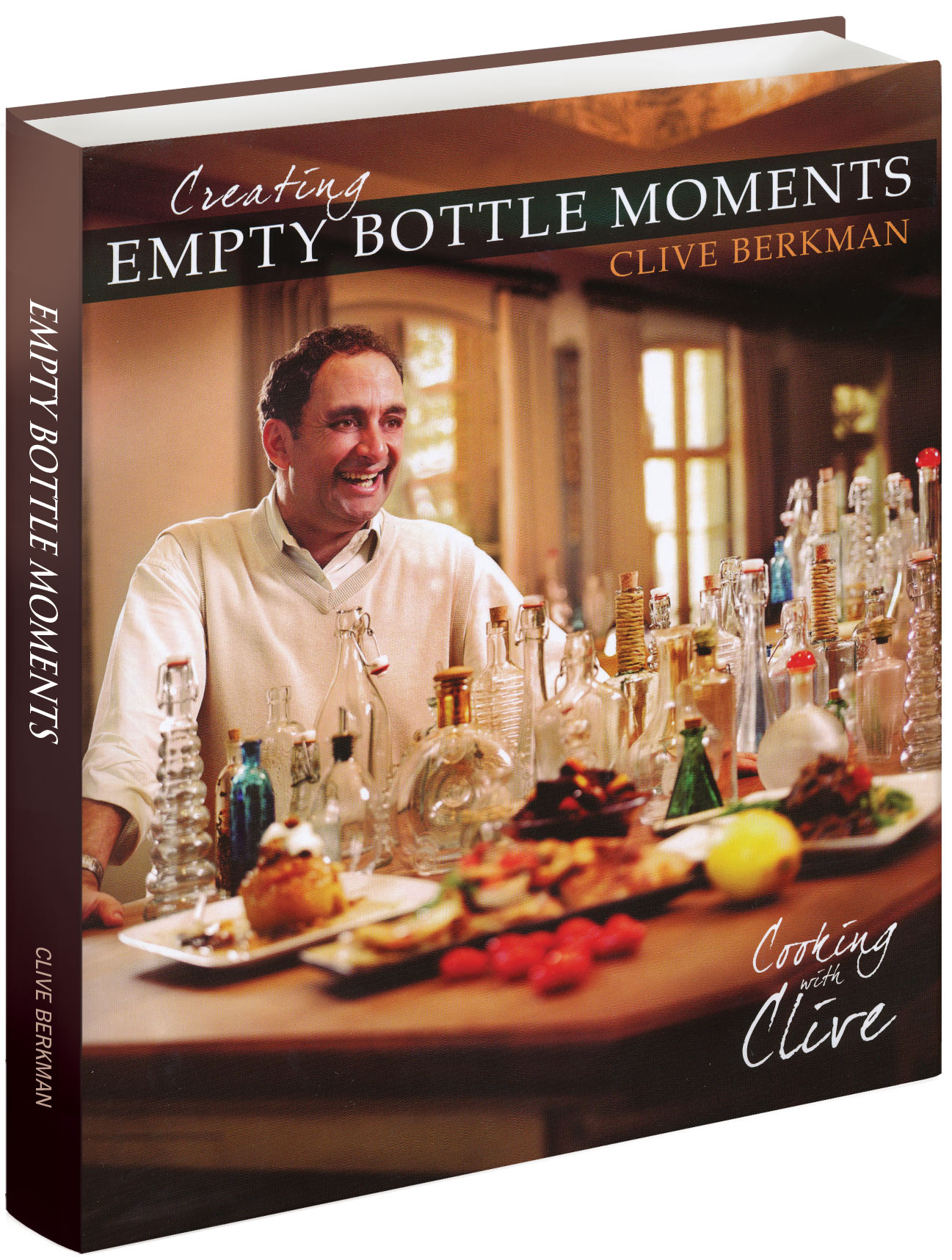 In his career as an accomplished chef and restaurateur, Clive Berkman has learned much more than how to prepare mouthwatering five-course meals. He finds that what he remembers most after a meal are the empty bottles, reminders of the power food has to strengthen bonds and create memories that last long after the table is cleared.
In his career as an accomplished chef and restaurateur, Clive Berkman has learned much more than how to prepare mouthwatering five-course meals. He finds that what he remembers most after a meal are the empty bottles, reminders of the power food has to strengthen bonds and create memories that last long after the table is cleared.
In Empty Bottle Moments, Berkman encourages at-home chefs to experiment with recipes as he recounts some of his most memorable dishes. He tells the stories of an impromptu celebratory dessert for George H. W. Bush on the night of the 1988 presidential polls and of serving multiple-entrée meals to ravenous pro-football linemen.
The recipes range from appetizers to desserts and give readers the tools to create a low-stress dining experience and empty bottle moments of their own. The book also includes a compendium of Berkman’s handy cooking tips. His passion for the culinary arts—and for spending quality time with others—brings each recipe to life. www.cookingwithclive.com



